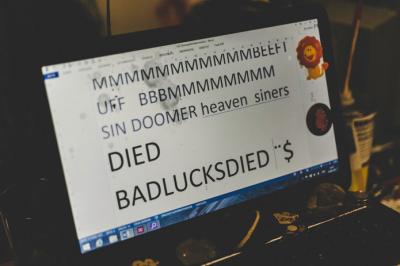
Xuman: Mocking the Powerful
With his rapped news show «Journal Rappé» (currently in its fourth season) Senegalese hip hop pioneer Xuman mocks the powerful. In this clip from 2014 he used the famous hit «Formidable» by Stromae and turned it into a parody on a fallen local politician. Our two authors consider that as «a thoughtful critique of the persisting disconnect between people and their governing representatives». A commentary from the Norient book Seismographic Sounds (see and order here).
How can popular music move citizens in an aesthetically appealing, though still critically engaging way? Parodia: Greek term for a counter- (para) song (oide). To resonate with the general public’s sense of humor, satiric imitations need familiar references. The recipe that Senegalese rapper Xuman uses in this parody is a mix of global sounds with a discursive and body performance distinctively situated in time and place. Hence he resorts to the musical product by the internationally-acclaimed Stromae: the métisse figure of pop music, an unintentional subject of African pride, a reflection of its diaspora and composite European heritage. Stromae’s song in particular, whose video clip went viral, shows him wandering and drunk, lamenting the loss of his girlfriend. The soundtrack is popular and its chorus is now familiar to many (see here and here).
The Fall of Karim Wade
But for a parody to be effective, the context must be recognizable. Appropriating the global hit about a fallen man, Xuman polemically references a quite local and specific reality: the one of a fallen political prince (we still have those on our dear continent!) on his way to his trial for «wrongfully acquired properties» during his mandate as minister under his father’s presidency. The performer uses past events in his discourse: Karim Wade’s fall was real, and the ingratitude and lack of understanding from Senegalese people, as well as the jealousy of a previous political opponent – now president – are the reasons behind his descent. Dressed up as a businessman after a nightlong party, with archival footage surrounded by Wade’s «great works» (hotels and roads), Xuman humorously mocks the once-upon-a-time political heir, blaming Senegalese people for forgetting about him and what he accomplished for Dakar: the city «looked like trash and, thanks to me, it’s more beautiful now.» They should not have judged him on the amount of money he spent, for «what matters is the result» and as such, he should be rewarded. The fallen prince, son of a presidential king, was wonderful, formidable, but misunderstood, as the parody ironically states.

Denouncing Political Legitimacy and Accountability
Xuman’s performance shows how humor is key here. He is fun to be serious, light to be deep, and through the joking about the absurdity of that delusion lies a thoughtful critique of the persisting disconnect between people and their governing representatives. The powerful aesthetics of a satiric video clip – it’s a wonderful parody – effectively denounce derailed political legitimacy and accountability.
This text was published first in the second Norient book Seismographic Sounds.
Biography
Biography
Shop

Published on November 02, 2017
Last updated on April 30, 2024







